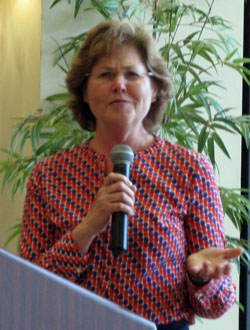
Rebecca Negron on Common Core
The Common Core standards and the processes that they have created, have a wide impact on K-12 education, with policy implications at the local, state, and national levels.
Many see them as an onerous regimen imposed on local school districts by the federal government, loaded with progessive bias in content, and counter to the local control of education that our system has featured since the dawn of public education. Teachers don’t like the program because it has too much emphasis on testing, and whittles away at their autonomy in the classroom. Administrators oppose them for the high stakes they impose on scoring individual schools. Parents object to the way subjects are taught (which some find incomprehensible, particularly in basic mathematics), the critical importance given to test results, and the lack of local control over the classroom.

In spite of this opposition, the train has left the station and Common Core is being implemented to various degrees across the country. Our speaker, Rebecca Negron attempted to make sense of all this from the point of view of a Martin County School Board member who was drawn to the office when she did not like the way her own children were being taught.
So what is the current state of Common Core in Florida?
In her view, testing is out of control – the tests are too frequent, and because teachers pay and school rating depend so heavily on the results, the objective of learning is sometimes lost. Martin County this year has opted out of giving End of Year exams.
Teachers evaluations – an attempt to separate the excellent from the mediocre, have failed – after spending $1.3M on implementing an evaluation process for the county, almost all teachers fall in the top two categories – hardly the differentiator that was intended.
School choice (vouchers) – in her view a good, market driven program, has caused a circle the wagons mentality within the system, with the FSBA (Florida School Board Association) joining with the teachers union (FEA) in a lawsuit to end the Tax Credit Scholarship Program. Martin County has considered withdrawing from FSBA membership for this reason.
Mrs. Negron claimed that the problem is not the content of the Common Core Standards themselves, but the implementation, particularly in the “approved” textbooks that she describes as choosing the “best of the worst”. Change is hard though, and she has had little success in convincing her school board colleagues to seek new textbooks or push back against the state imposition of the standards and curriculum. The issues have moved up in the government food chain and local School Boards can do little given what is mandated at the state level, which in turn is influenced by the education dollars flowing from the federal government.
Quite a few questions led to a lively discussion at the end of the session, with many in the audience having been on the front lines of the common core fight. Identified by some as the villian of the piece, Jeb Bush and his “Excellence in Education” foundation have been a driving force for common core. It was pointed out that many in the legislature, including Rebecca’s husband Senator Joe Negron, have served on Bush’s board, making opposition in Tallahassee an uphill fight.
As many continued the discussion with Mrs. Negron after the session ended, it seemed clear that her assessment of the state of common core does not sit well, and there is much frustration that School Boards in Martin and Palm Beach County are not doing enough to push back against the common core juggernaut.